By Robert St. Martin
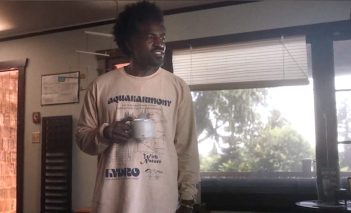 Los Angeles, CA (The Hollywood Times) 6/19/23 – Currently playing at the Micro-Cinema of the newly opened Vidiots/Eagle Theatre on Eagle Rock Boulevard in Northeast Los Angeles is Kelly Reichardt’s latest film Showing Up. This is a movie inspires reflection on art as process in part because it makes art its subject. This is not a film for mass audiences but will be appreciated by artists and those who know artists. Showing Up is centered on Lizzy (Michelle Williams), a ceramicist just one week away from an exhibition of her work. Her ceramic pieces are a series of playful, textured figures in motion – mostly female figures – which she is rushing to finish in time for a gallery exhibition in Portland, Oregon. The movie is shot in documentary style, showing her efforts to complete them in time. But Reichardt’s film is also the story of an artist dealing with her life as well as her art. Williams performs Lizzy as someone trying to keep a lid on her stress with family, friends, and another seemingly more successful artist named Jo. Showing Up opened at Vidiots on Saturday, June 17 and will play through Thursday, June 22. Check the Vidiots website for times and tickets: https://vidiotsfoundation.org/movies/showing-up/
Los Angeles, CA (The Hollywood Times) 6/19/23 – Currently playing at the Micro-Cinema of the newly opened Vidiots/Eagle Theatre on Eagle Rock Boulevard in Northeast Los Angeles is Kelly Reichardt’s latest film Showing Up. This is a movie inspires reflection on art as process in part because it makes art its subject. This is not a film for mass audiences but will be appreciated by artists and those who know artists. Showing Up is centered on Lizzy (Michelle Williams), a ceramicist just one week away from an exhibition of her work. Her ceramic pieces are a series of playful, textured figures in motion – mostly female figures – which she is rushing to finish in time for a gallery exhibition in Portland, Oregon. The movie is shot in documentary style, showing her efforts to complete them in time. But Reichardt’s film is also the story of an artist dealing with her life as well as her art. Williams performs Lizzy as someone trying to keep a lid on her stress with family, friends, and another seemingly more successful artist named Jo. Showing Up opened at Vidiots on Saturday, June 17 and will play through Thursday, June 22. Check the Vidiots website for times and tickets: https://vidiotsfoundation.org/movies/showing-up/
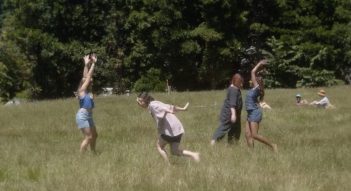 Kelly Reichardt is filmmaker who I have enjoyed following for some time. Showing Up is bigger on story that most of her previous films which specialize in moody depictions of wanderers and seeks, like Old Joy, Wendy and Lucy, Meek’s Cutoff and Certain Women. Her last film which hit the theatres at the onset of COVID was First Cow, and it featured a more linear “story.” Perhaps because Reichardt has been teaching at Bard College of late and quite aware of what a small liberal arts college set away from the bustling city can be like, Showing Up seemed like a natural place to tell a story about art students working at a college, sculpting, working at looms, or dancing randomly on the grassy lawn – a seemingly Utopian college environment of idyllic coziness.
Kelly Reichardt is filmmaker who I have enjoyed following for some time. Showing Up is bigger on story that most of her previous films which specialize in moody depictions of wanderers and seeks, like Old Joy, Wendy and Lucy, Meek’s Cutoff and Certain Women. Her last film which hit the theatres at the onset of COVID was First Cow, and it featured a more linear “story.” Perhaps because Reichardt has been teaching at Bard College of late and quite aware of what a small liberal arts college set away from the bustling city can be like, Showing Up seemed like a natural place to tell a story about art students working at a college, sculpting, working at looms, or dancing randomly on the grassy lawn – a seemingly Utopian college environment of idyllic coziness.
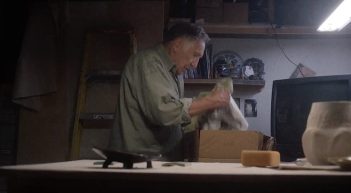 The story takes place all in a week. Lizzy feels barred from the pleasures of creativity enjoyed by the art students. She has obviously already graduated from the art school and now works at the college as a publicist in an office along with none other than her own mother, Jean (Maryann Plunkett), who seems to just brush her off much of the time. Reichardt and co-writer Jon Raymond thread Ozu-like intervals of adjacent activity throughout the film, which replicates the sensation of walking down a visual arts building’s halls, equally impressed with and confounded by the various in-progress projects. The location of the film is actually Oregon College of Art and Craft in Portland, which I understand recently closed in 2021.
The story takes place all in a week. Lizzy feels barred from the pleasures of creativity enjoyed by the art students. She has obviously already graduated from the art school and now works at the college as a publicist in an office along with none other than her own mother, Jean (Maryann Plunkett), who seems to just brush her off much of the time. Reichardt and co-writer Jon Raymond thread Ozu-like intervals of adjacent activity throughout the film, which replicates the sensation of walking down a visual arts building’s halls, equally impressed with and confounded by the various in-progress projects. The location of the film is actually Oregon College of Art and Craft in Portland, which I understand recently closed in 2021.
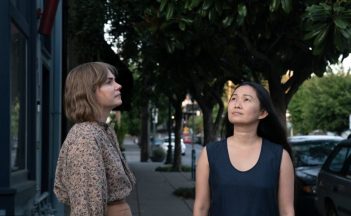 The film opens with colorful sketches of the ceramic figures that Lizzy has been making and attempting to finish for an exhibition at the end of the week. Lizzy is introduced working on her sculptures in her garage studio, interrupting her process to ask her old classmate and landlord, Jo (Hong Chau), to fix her water heater. Her best friend is Jo, a fellow artist, inherited money from her family and owns a few apartments near the university. As Lizzy sees it, “Jo’s got it figured out.” Lizzy is jealous of Jo, who is very focused on her own woven art pieces and has two exhibitions planned for the week. Jo seems quite nonchalant about things and isn’t the tense mess that Lizzy has become. Lizzy is also angry at Jo for dragging her feet on fixing her water heater, and Lizzy declares she needs a shower to anyone who will listen.
The film opens with colorful sketches of the ceramic figures that Lizzy has been making and attempting to finish for an exhibition at the end of the week. Lizzy is introduced working on her sculptures in her garage studio, interrupting her process to ask her old classmate and landlord, Jo (Hong Chau), to fix her water heater. Her best friend is Jo, a fellow artist, inherited money from her family and owns a few apartments near the university. As Lizzy sees it, “Jo’s got it figured out.” Lizzy is jealous of Jo, who is very focused on her own woven art pieces and has two exhibitions planned for the week. Jo seems quite nonchalant about things and isn’t the tense mess that Lizzy has become. Lizzy is also angry at Jo for dragging her feet on fixing her water heater, and Lizzy declares she needs a shower to anyone who will listen.
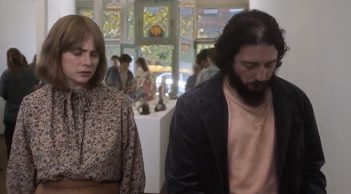 She finds reasons to be either concerned for or at odds with each member of her family: Jean (Maryann Plunkett), her mother and boss at the Oregon College of Art and Craft, is too critical; Bill (Judd Hirsch), her father, is being taken advantage of by freeloading lodgers; Sean (John Magaro), her brother, is taking his eccentricity by digging up the backyard with giant holes that he calls “earthworks.” From the start of the film, Lizzy is overwhelmed by her ever-present cat’s basic needs. And soon culminates is her cat’s capture of a pigeon in the bathroom – which leads to her obsessing over this wounded pigeon which curiously enough is “rescued’ by Jo, who insists that Lizzy help her save it in a little box that the two alternately handle through the remainder of the story.
She finds reasons to be either concerned for or at odds with each member of her family: Jean (Maryann Plunkett), her mother and boss at the Oregon College of Art and Craft, is too critical; Bill (Judd Hirsch), her father, is being taken advantage of by freeloading lodgers; Sean (John Magaro), her brother, is taking his eccentricity by digging up the backyard with giant holes that he calls “earthworks.” From the start of the film, Lizzy is overwhelmed by her ever-present cat’s basic needs. And soon culminates is her cat’s capture of a pigeon in the bathroom – which leads to her obsessing over this wounded pigeon which curiously enough is “rescued’ by Jo, who insists that Lizzy help her save it in a little box that the two alternately handle through the remainder of the story.
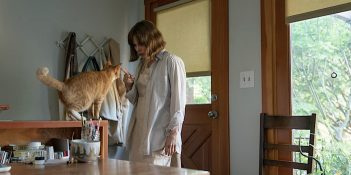 Showing Up is a campus film in the way that John Williams’s Stoner or Vladimir Nabokov’s Pnin are campus novels, steeped in its main character’s melancholic, at times enervating resignation. Lizzy is positioned by Reinhardt so often as an observer in this larger artistic community. If this is supposed to be Lizzy’s story, she is too often pushed to the side in the narrative turns of this film. Showing Up leaves unresolved the familial, creative, professional, and interpersonal matters at its core, staying true to its vision of an artistic environment perpetually caught between modest comfort and precariousness – which is what the life of most artists are really like.
Showing Up is a campus film in the way that John Williams’s Stoner or Vladimir Nabokov’s Pnin are campus novels, steeped in its main character’s melancholic, at times enervating resignation. Lizzy is positioned by Reinhardt so often as an observer in this larger artistic community. If this is supposed to be Lizzy’s story, she is too often pushed to the side in the narrative turns of this film. Showing Up leaves unresolved the familial, creative, professional, and interpersonal matters at its core, staying true to its vision of an artistic environment perpetually caught between modest comfort and precariousness – which is what the life of most artists are really like.
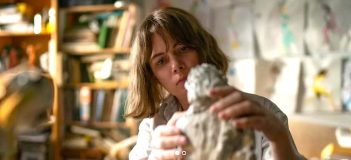 Just as we learn to grudgingly like Lizzy, we also see the value in her ceramic work (which is actually the real ceramic work of Portland, Oregon’s Cynthia Lahti) as it slowly comes together, emerging from the kiln with new colors and finally being displayed among her family and friends. One of the assistants at the college Eric (André Benjamin, a.k.a. André 3000), the school’s amenable kiln master oozes positive vibes and a visiting artist (Heather Lawless) is frankly taken with Lizzy’s work and to some extent Lizzy herself.
Just as we learn to grudgingly like Lizzy, we also see the value in her ceramic work (which is actually the real ceramic work of Portland, Oregon’s Cynthia Lahti) as it slowly comes together, emerging from the kiln with new colors and finally being displayed among her family and friends. One of the assistants at the college Eric (André Benjamin, a.k.a. André 3000), the school’s amenable kiln master oozes positive vibes and a visiting artist (Heather Lawless) is frankly taken with Lizzy’s work and to some extent Lizzy herself.
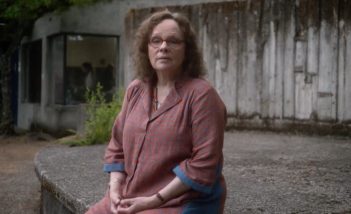 The title of the film has a dual meaning and expresses the tension in this small community of artists, or, at least, the tension Lizzy feels. Showing Up can mean showing up for others, supporting, attending Jo’s show, and being happy for her success. “Showing Up” also means feeling like others are ahead of you, doing way better than you, and obliterating your own accomplishments. If you feel “shown up” by your peers, it’s impossible to “show up” for others. The pigeon with its broken wings is perhaps a too-obvious metaphor for Lizzy’s own condition. Lizzy ends up toting around a wounded pigeon, acting as its caretaker, but then, almost randomly, the bird is stripped of its bandages by two little girls in the crowd at the gallery show, then tossed to the sky by Lizzy’s mentally troubled, brother, Sean (John Magaro). Showing Up is a gently observant, understated film about the frustrations of being an artist.
The title of the film has a dual meaning and expresses the tension in this small community of artists, or, at least, the tension Lizzy feels. Showing Up can mean showing up for others, supporting, attending Jo’s show, and being happy for her success. “Showing Up” also means feeling like others are ahead of you, doing way better than you, and obliterating your own accomplishments. If you feel “shown up” by your peers, it’s impossible to “show up” for others. The pigeon with its broken wings is perhaps a too-obvious metaphor for Lizzy’s own condition. Lizzy ends up toting around a wounded pigeon, acting as its caretaker, but then, almost randomly, the bird is stripped of its bandages by two little girls in the crowd at the gallery show, then tossed to the sky by Lizzy’s mentally troubled, brother, Sean (John Magaro). Showing Up is a gently observant, understated film about the frustrations of being an artist.




